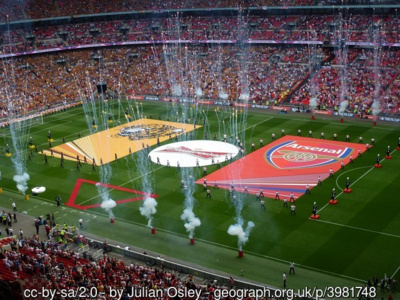
The FA Cup is undoubtedly one of the most prestigious competitions in England. In fact, it could be argued that the event is so popular it’s one of the biggest in the world.
Its prestige comes from the fact that so many teams are involved, with 736 being eligible to play at different stages. With it you often find lower league teams come up against higher league teams, in a David v Goliath type battle.
The completion is run by the Football Association and has been going since 1871. The teams involved drop down to as low as the 10th tier of the English Football League system, working its way right up to the Premier League.
-
- In This Article:
The Road to Wembley
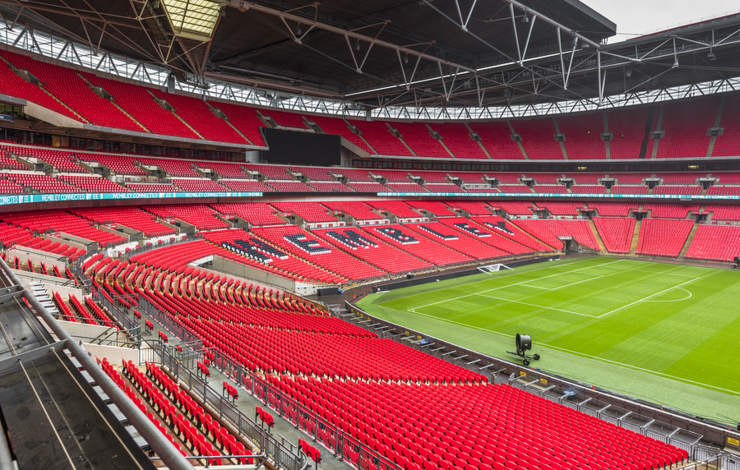
As the final of the FA Cup takes place at Wembley each year, the qualifying process and even the FA Cup proper is often known as the road to Wembley. In all honesty, for most teams just getting through the qualifying stages is an achievement in its own.
Qualifying Rounds
The qualifying rounds start as early as August and with it there are 368 teams that are entered into the draw. As stated, the first round will include teams as low as levels 8, 9 and 10 within the English football league system. Throughout the whole process a single game will be played, with each team being drawn to play either home or away. If the game ends as a tie then a replay will be played at the oppositions ground, before extra time and penalties if needed.
The first two rounds are actually Preliminary and Extra Preliminary stages for the cup. The latter will see the inclusion of level 8 clubs, along with the winners of the Extra preliminary games as well. In total, across the opening two stages, a total of 344 games are played.
The first round of the qualifying rounds kicks off in September and for a lot of clubs even reaching this stage is a massive achievement. The inclusion of Level 7 clubs filter in and from here 232 clubs will be included in the draw. The second round includes level 6, the third have no additional entries and the fourth sees level 5 teams included.
Qualifying Schedule – Season 2020/21
| Round | Start Date | Details & Entrants |
|---|---|---|
| Extra Preliminary | 1st Sept 2020 | 368 amateur and semi-pro teams from tiers 8, 9 & 10 |
| Preliminary | 12th Sept 2020 | 136 tier 7 & 8 teams enter, with a total of 160 ties |
| 1st Qualifying | 22nd Sept 2020 | 74 level 7 clubs join, 116 fixtures played |
| 2nd Qualifying | 3rd Oct 2020 | Addition of 43 National League North and South sides |
| 3rd Qualifying | 13th Oct 2020 | 80 sides from previous round with no additional teams |
| 4th Qualifying | 24th Oct 2020 | 23 National league teams join the remaining 40 qualifiers |
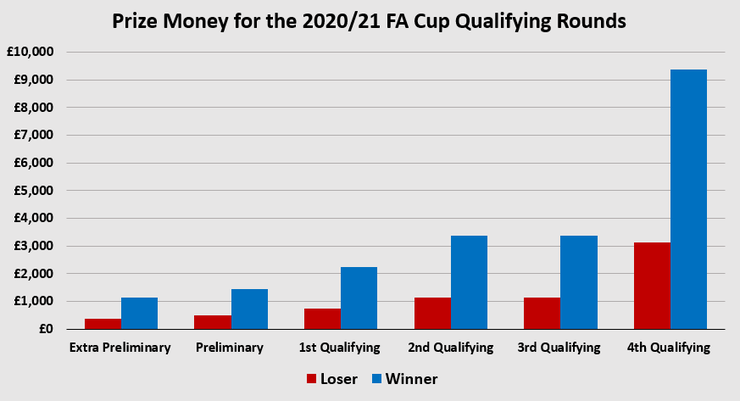
Competition Proper
The actual FA Cup rounds kicks off in November and this is very much known as the FA Cup proper, as we move away from the qualifying competition. The first round includes teams from level 3 and 4 enter the fold, with 80 teams in total, including those who have qualified. The second round is then played out in December and will include 40 teams that have progressed, with no new teams entering at this stage.
The third round of the FA Cup is probably the most anticipated time as this is when the top 2 levels are included and these also make up the final inclusions for the competition. The realisation that teams from the Premier League are able to play non-league sides that have made it through make for some highly interesting ties. This round is also famously linked with the phrase ‘magic of the FA Cup’ and over the years has seen some big upsets from lower league opposition knocking out Premier League teams.
By the time the third round comes around, there are 64 teams left in total. The process remains the same though in that one team is drawn at home and the other obviously drawn away. If the score ends as a draw they reply at the oppositions ground. But, it has been known for smaller teams to switch the tie around if drawn against larger teams as it means that, given the way gate receipts are distributed, they can earn more money due to increase in capacity.
The FA Cup then follows a pretty straightforward knockout stage, with the last 16, quarter finals, semi-finals and then final. It’s worth noting that both the semi-finals and the final are all played at Wembley Stadium as well.
Cup Schedule – Season 2020/21
| Round | Start Date | Details & Entrants |
|---|---|---|
| First | 6th Nov 2020 | 48 clubs from Leagues 1 & 2 join 32 non-league qualifiers |
| Second | 27th Nov 2020 | 40 winning sides from round one compete |
| Third | 8th Jan 2021 | 44 Premier League and Championship teams join |
| Fourth | 22nd Jan 2021 | 16 matches with the 32 teams that won through from round 3 |
| Fifth | 9th Feb 2021 | 16 teams across 8 fixtures battle for a quarter-final place |
| Quarter-finals | 20th Mar 2021 | Last round where teams can have a home advantage |
| Semi-finals | 17th Apr 2021 | Both ties played at Wembley, with extra time and penalties |
| Final | 15th May 2021 | Wembley finale, extra time and penalties may be required |
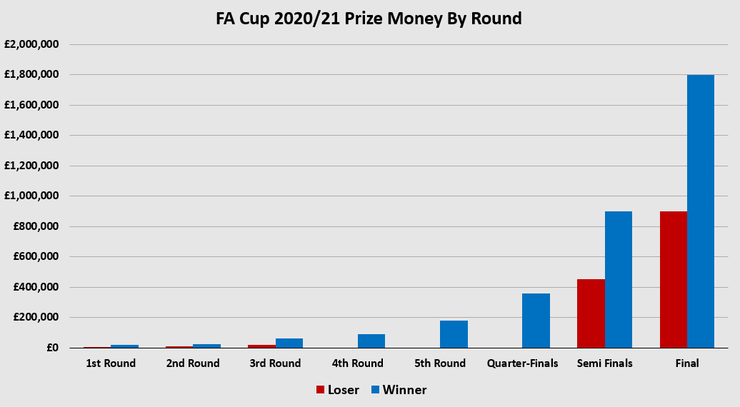
Statistics
As the FA Cup is almost 150 years old, there’s quite a lot of statics and data that you can wade through. But, one team that have dominated the competition over this time is Arsenal, winning it on 14 separate occasions, with their first coming 1930 and most recent coming in 2020. Arsenal are only 1 of 4 teams to have won the FA Cup on consecutive occasions more than once, in 2002, 2003 and 2014, 2015.
Staying with Arsenal, it probably comes as little surprise to hear that their manager, Arsene Wenger, is the most decorated manger in the competition as well. Wenger has won 7 FA Cup’s, with his first coming in 1998 and most recent, that of the 2017 win. Arsenal also been in more finals than any other team, with 21 appearances, 1 ahead of Manchester United.
Most Successful Teams by Wins and Finals
| Teams | Wins | Finals | First Win | Last Win |
|---|---|---|---|---|
| Arsenal | 14 | 21 | 1930 (vs Huddersfield) | 2020 (vs Chelsea) |
| Manchester United | 12 | 20 | 1909 (vs Bristol City) | 2016 (vs Crystal Palace) |
| Chelsea | 8 | 16 | 1970 (vs Leeds United) | 2018 (vs Manchester Utd) |
| Liverpool | 8 | 15 | 1965 (vs Leeds United) | 2022 (vs Chelsea) |
| Tottenham Hotspur | 8 | 9 | 1901 (vs Sheffield United) | 1991 (vs Nott’m Forest) |
| Aston Villa | 7 | 11 | 1887 (vs West Brom) | 1957 (vs Manchester Utd) |
| Newcastle United | 6 | 13 | 1910 (vs Barnsley) | 1955 (vs Manchester City) |
| Manchester City | 6 | 11 | 1904 (vs Bolton) | 2019 (vs Watford) |
| Blackburn Rovers | 6 | 8 | 1884 (vs Queen’s Park) | 1928 (vs Huddersfield) |
| Everton | 5 | 13 | 1906 (vs Newcastle Utd) | 1995 (vs Manchester Utd) |
| West Brom | 5 | 10 | 1888 (vs Preston NE) | 1968 (vs Everton) |
| Wanderers FC | 5 | 5 | 1872 (vs Royal Engineers) | 1878 (vs Royal Engineers) |
| Wolves | 4 | 8 | 1893 (vs Everton) | 1960 (vs Blackburn) |
| Bolton Wanderers | 4 | 7 | 1923 (vs West Ham Utd) | 1958 (vs Manchester Utd) |
| Sheffield United | 4 | 6 | 1899 (vs Derby County) | 1925 (vs Cardiff City) |
| Sheffield Weds | 3 | 6 | 1896 (vs Wolves) | 1935 (vs West Brom) |
| West Ham United | 3 | 5 | 1964 (vs Preston NE) | 1980 (vs Arsenal) |
| Preston North End | 2 | 7 | 1889 (vs Wolves) | 1938 (vs Huddersfield) |
| Old Etonians | 2 | 6 | 1879 (vs Clapham Rovers) | 1882 (vs Blackburn) |
| Portsmouth | 2 | 5 | 1939 (vs Wolves) | 2008 (vs (Cardiff City) |
| Sunderland | 2 | 4 | 1937 (vs Preston NE) | 1973 (vs Leeds United) |
| Nottingham Forest | 2 | 3 | 1898 (vs Derby County) | 1959 (vs Luton Town) |
| Bury | 2 | 2 | 1900 (vs Southampton) | 1903 (vs Derby County) |
Over the last decade or so we’ve seen quite a few teams outside of the ‘Big 6’ have quite a bit of success in the FA Cup. In fact, in that time we haven’t seen the same two teams in the final at all. The likes of Watford, Cardiff City, Everton, Portsmouth, Stoke City, Hull City and Crystal Place have all made FA Cup final appearances.
But, the winners have largely been the same teams that you see year in, year out. The likes of Arsenal, Chelsea, Manchester United and Manchester City have been the figurehead for most of the wins in the competition. However, there have been a few curve balls in the form of Leicester City in 2020/21, Wigan athletic in 2012-13 and also Portsmouth back in 2007-08 season, all three upsetting the odds to take away the crown.
FA Cup Finals: 2000 – 2022
| Year | Winner | Runner-up | Score | Winning Team Captain |
|---|---|---|---|---|
| 2022 | Liverpool | Chelsea | 0-0 (6-5 pens) | Jordan Henderson |
| 2021 | Leicester City | Chelsea | 1-0 | Kasper Schmeichel |
| 2020 | Arsenal | Chelsea | 2-1 | P-E Aubameyang |
| 2019 | Manchester City | Watford | 6-0 | Vincent Kompany |
| 2018 | Chelsea | Manchester United | 1-0 | Gary Cahill |
| 2017 | Arsenal | Chelsea | 2-1 | Per Mertesacker |
| 2016 | Manchester United | Crystal Palace | 2-1 AET | Wayne Rooney |
| 2015 | Arsenal | Aston Villa | 4-0 | Per Mertesacker |
| 2014 | Arsenal | Hull City | 3-2 AET | Mikel Arteta |
| 2013 | Wigan Athletic | Manchester City | 1-0 | Emmerson Boyce |
| 2012 | Chelsea | Liverpool | 2-1 | John Terry |
| 2011 | Manchester City | Stoke City | 1-0 | Carlos Tevez |
| 2010 | Chelsea | Portsmouth | 1-0 | John Terry |
| 2009 | Chelsea | Everton | 2-1 | John Terry |
| 2008 | Portsmouth | Cardiff City | 1-0 | Sol Campbell |
| 2007 | Chelsea | Manchester United | 1-0 | John Terry |
| 2006 | Liverpool | West Ham United | 3-3 (3-1 pens) | Steven Gerrard |
| 2005 | Arsenal | Manchester United | 0-0 (5-4 pens) | Patrick Viera |
| 2004 | Manchester United | Millwall | 3-0 | Roy Keane |
| 2003 | Arsenal | Southampton | 1-0 | David Seaman |
| 2002 | Arsenal | Chelsea | 2-0 | Tony Adams |
| 2001 | Liverpool | Arsenal | 2-1 | Sami Hyypia |
| 2000 | Chelsea | Aston Villa | 1-0 | Dennis Wise |
History
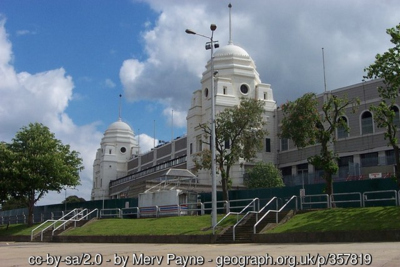
The competition has a long history and dates back to 1863 when the Football Association first published laws of the game. It wasn’t until 1871 when the then FA secretary C W Alcock had proposed plans to form a Challenge Cup, where teams would be invited to play. This then lead onto the formation of the FA Cup later that year, with just 26 teams being represented. The first winners were that of Wanderers FC, who then went on to retain their crown the following year as well.
The first final that was played at Wembley Stadium was in 1923 and with it saw the stadium host finals for the majority of the 20th century and now the 21st century. They had a couple of gaps between the first and second World War, but since then has been running ever since 1946. The centenary year didn’t occur until 1980-81 season and with it saw one of the greatest goals ever scored by that of Ricky Villa. However, this goal has arguably since been replaced by Steven Gerrard’s 2006 strike.
The final has taken place for the majority of time at the Wembley Stadium, but due to refurbishments, was hosted by Cardiff’s Millennium stadium from 2001-2006. It’s now a firm feature back at Wembley, and since 2008 the stadium has also hosted the semi-final matches as well in a bid to create more of a prestigious tournament.
As stated previously in the article, the competition is open to the top 10 levels of the football league. The top 4 levels, that include the Premier League, Championship, League 1 and League 2 are the only teams that get automatic qualification into the FA Cup proper, with the Premier League and Championship entering the fold in the 3rd round.
The First Final – Wanderers FC v Royal Engineers (1872)

The first ever FA Cup final was held between Wanderers FC and Royal Engineers. It was hosted at the Kennington Oval in London, with 2,000 fans in attendance. The winners on the day was Wanderers FC, which in itself was a bit of an upset. The Royal Engineers were very much the favourites for the match and the team was renowned for playing very eye-catching football, heavily based around passing.
But, even though the game finished 1-0, it was a game that Wanders FC dominated and ran out pretty comfortable winners in the end. Wanderers FC also went on to win the tournament the following year as well.
Famous Giant Killings

One of the reasons why the FA Cup is so popular is that it often produces some major upsets in the world of football. There are many times where non-league opposition has managed to overcome league and even Premier League teams, with some of the higher profile matches listed below.
Hereford United 2 – 1 Newcastle United (1972)
Probably the biggest and most well-known was that of the famous victory in the mud of Hereford beating Newcastle United. Hereford had already done the unthinkable and managed to get a 2-2 draw at St James’ Park, but it was their heroics at home that cemented their place in history.
They trailed the game 1-0 thanks to a Malcolm MacDonald goal for Newcastle, but turned the game on its head with a 40 yard thunderbolt from Ronnie Radford, before in extra time they bagged the winner via Ricky George to send the non-league side through.
Bournemouth 2-0 Manchester United (1984)
These days a 2-0 Bournemouth victory over Manchester United is pretty rare, but not unthinkable given they are both now established Premier League sides. But, when the two teams met in 3rd round of the FA Cup in 1984, the two teams couldn’t have been more different.
Manchester United were the cup holders and going for back to back wins under manager Ron Atkinson. Bournemouth were in the third division and were managed by none other than Harry Redknapp. A straight forward victory for Manchester United looked on the cards, but Bournemouth had other ideas.
Goals from Milton Graham and Ian Thompson managed to secure a 2-0 victory, leaving even the great Harry Redknapp lost for words after the match.
Wrexham 2 -1 Arsenal (1992)
At the time Arsenal were flying high in the First Division, currently sitting second as they looked to retain their title from the previous season. Wrexham couldn’t have been any further down the football league standings, sitting bottom of the entire football league. Many people hadn’t even figured this game to be a contest and when Arsenal went 1-0 thanks to Alan Smith, the floodgates looked sure to open.
But, Wrexham held strong right up until the 80th minute when Mickey Thomas was able to curl a beautiful free kick past David Seaman in the Arsenal goal. In a game that they had never looked like winning, they were all of a sudden back in it. Then, with just seconds to spare, Steve Watkins made a name for himself by grabbing the winner and causing one of the biggest upsets in FA Cup history.
Manchester City v Wigan (2013)
The win for Wigan in the 2013 FA Cup final over Manchester City has to go down as not only one of the biggest upsets in the tournaments history, but also one of the most bizarre. As both teams were in the Premier League, the fact that Wigan managed to win 1-0 was a shock, but by no means a giant killing.
But, the fact that Wigan won the FA Cup and then went on to be relegated from the Premier League just 3 days later puts them well within FA Cup folklore. In fact, they are the only team in almost 150 years of the FA Cup to have won the cup and also been relegated in the same season.
2012/13 Season Premier League Final Positions
| Position | Team | Games | Won | Drawn | Lost | GF | GA | Points |
|---|---|---|---|---|---|---|---|---|
| 2 | Man City | 38 | 23 | 9 | 6 | 66 | 34 | 78 |
| 18 | Wigan | 38 | 9 | 9 | 20 | 47 | 73 | 36 |
Wimbledon’s Shock Victory (1988)
Wimbledon’s FA Cup victory in 1988 will probably go down as one of the most impressive, but also most bizarre in the competitions history. As a bit of background before the win, the club had only been in the football league for 11 years and had only been in the top flight for just 2 seasons.
In the final they faced Liverpool, who were probably one of the best teams in Europe at the time, never mind England. With 98,000 packed into Wembley, the ‘Crazy Gang’ were able to win the game 1-0 with a Lawrie Sanchez header. Liverpool had much the better of the game, but Wimbledon were able to hang on to win their one and only FA Cup winners medal.
1988 FA Cup Final Team Lineups
| Number | Liverpool | Wimbledon |
|---|---|---|
| 1 | Bruce Grobbelaar | Dave Beasant (c) |
| 2 | Gary Gillespie | Clive Goodyear |
| 3 | Gary Ablett | Terry Phelan |
| 4 | Steve Nicol | Vinnie Jones |
| 5 | Nigel Spackman | Eric Young |
| 6 | Alan Hansen (c) | Andy Thorn |
| 7 | Peter Beardsley | Terry Gibson |
| 8 | John Aldridge | Alan Cork |
| 9 | Ray Houghton | John Fashanu |
| 10 | John Barnes | Lawrie Sanchez |
| 11 | Steve McMahon | Dennis Wise |
| 12 | Craig Johnston | John Scales |
| 14 | Jan Molby | Laurie Cunningham |
| Manager | Kenny Dalglish | Bobby Gould |
Manchester United’s Treble (1999)
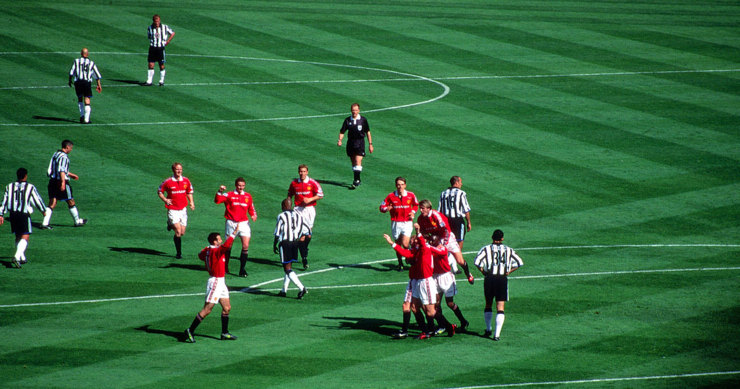
The 1999 final probably wasn’t the best spectacle ever, with Manchester United going on to beat Newcastle United at Wembley. Goals from Teddy Sheringham and Paul Scholes sealed Newcastle’s fate and with it their illusive search for some silverware since the sixties continued.
But, it was United that the final was really about, and more to the point if they could go on to win a monumental treble. They had previously already won the Premier League and the FA Cup would be another chance to go for the treble. The FA Cup win allowed them to carry this momentum on to the UEFA Champions League final just 4 days later to crown what was one of the most impressive domestic and European Cup displays of all time.
Liverpool v West Ham (2006)
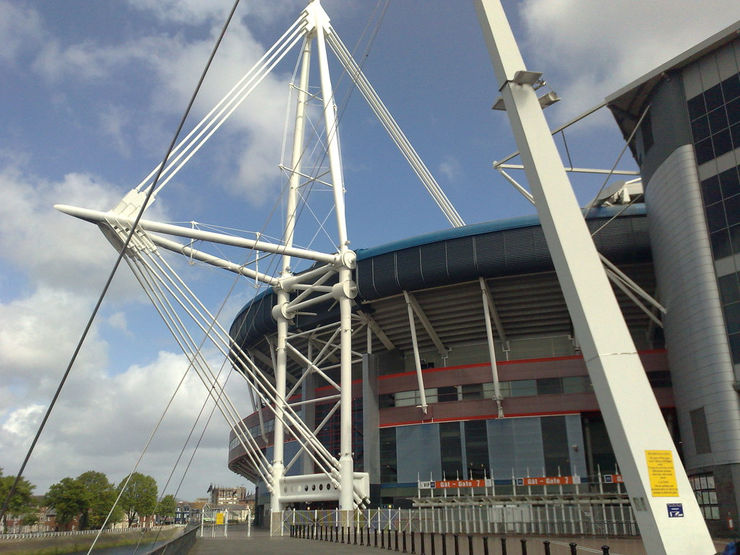
If the final above failed to really set alight, the 2006 final between Liverpool and West Ham was one of the best ever. It took place at Cardiff’s Millennium Stadium and it was widely regarded that Liverpool would come away winners from the match.
But, things didn’t start well for Liverpool as they found themselves 1-0 down after just 20 minutes thanks to a Jamie Carragher own goal. Cisse equalised, before dean Ashton put the hammers back in front. A Steven Gerard equaliser was quickly followed by a third thanks to Paul Konchesky. In the first minute of added on time it was Gerrard again who turned out to be the Liverpool saviour, scoring one of the best goals ever from 30 yards out to level things ups.
Extra time was a stalemate in the game and so it went down to penalties. Liverpool were able to scrape the win 3-1 on penalties, with goalkeeper Pepe Reina becoming the hero for Liverpool.